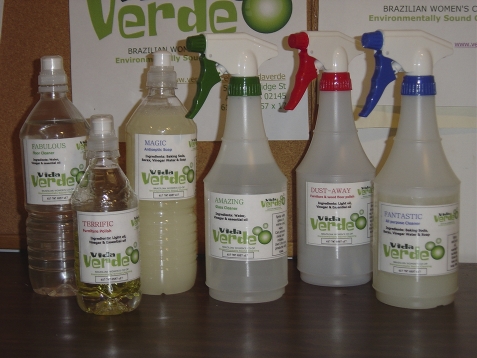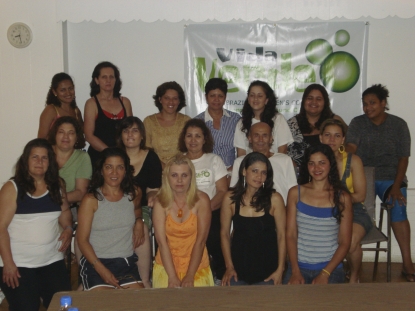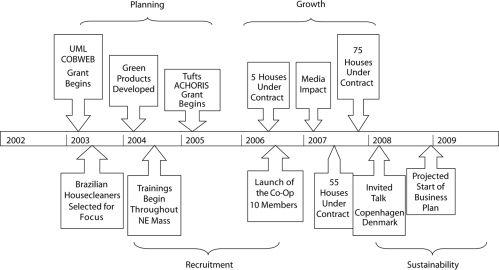Abstract
We reviewed the key steps in the launch of the Vida Verde Women's Co-Op among Brazilian immigrant housecleaners in Somerville, MA. The co-op provides green housecleaning products, encourages healthy work practices, and promotes a sense of community among its members. We conducted in-depth interviews with 8 of the first co-op members, who reported a reduction in symptoms associated with the use of traditional cleaning agents and a new sense of mutual support. Critical to the co-op's success have been the supportive roles of its academic partners (Tufts University and the University of Massachusetts, Lowell), effective media outreach, and a focus on advancing social justice. Next steps include implementing a formal business plan and assessing the appropriateness of cooperatives in other industries.
IMMIGRANTS ARE AT AN increased risk of work-related disease and injury. A developing conceptual literature1 and evidence from industry2 support this conclusion. The ability to document such disparities is complicated by a host of factors, including cultural and language barriers, insufficient trust in host-society institutions, and the lack of health insurance. In addition, problems encountered in tracking occupational health outcomes range from a broad lack of reporting3 to definitional issues.4
We examined the conceptualization, launch, and evaluation of the Vida Verde Women's Co-Op championed by the Brazilian Women's Group (BWG) of Massachusetts (http://verdeamarelo.org). The cleaning worker industry has attracted some of the growing interest in the hazards posed by various informal segments of the global economy.5 Housecleaning is the most common occupation of Brazilian women in Massachusetts. Estimates of the proportion of Brazilian immigrants engaged in housecleaning range from 7.4% to 25.5%; this range reflects the broader categories of building and grounds cleaning and maintenance operations.6 Because of this concentration of employment and constant contact with toxic chemicals, the development of the co-op can be seen as a direct outgrowth of environmental justice concerns.
A growing literature describes the respiratory, dermatological, and ergonomic health outcomes associated with housecleaning.7–9 Traditional household cleaning agents have come under greater scrutiny because of their irritant and caustic effect on both professional and nonprofessional housecleaners.10 These health concerns spurred the launch of the co-op, which features the use of green, or less toxic, cleaning materials. Equally important to the founders of the co-op was cultivating a sense of community and empowerment among its members that historically is lacking in the housecleaning industry.
A collaboration between 2 research projects—Assessing and Controlling Occupational Health Risks to Immigrants in Somerville, Massachusetts, led by Tufts University and funded by the National Institute for Occupational Safety, and the Collaboration for Better Work Environment Among Brazilians, based at the University of Massachusetts, Lowell (http://www.cobwebproject.org) and funded by the National Institute for Environmental Health Sciences—provided the impetus for the co-op.
PROGRAM DESCRIPTION
The BWG is a volunteer-run grassroots organization founded in 1995. The BWG's mission is to empower Brazilian immigrant women by enhancing their development and cultivating self-sufficiency. The co-op was intended by members of the BWG (some of whom were housecleaners) to be a culturally appropriate intervention that would engender participatory decision-making and collective benefits and address locus-of-control issues that define work as a housecleaner. This model also built on a tradition of co-ops in Brazil as well as on the cleaning cooperatives established by the Women's Action to Gain Economic Security organization in the San Francisco Bay area (http://www.wagescooperatives.org).
KEY FINDINGS
▪ From the data collected to date, it is clear that this small cohort of co-op members were ready and willing to join a new community and start a new life in Somerville, MA.
▪ All of the members experienced adverse health reactions to highly toxic cleaning products; they reported being nonsymptomatic and happier with use of their own green cleaning products. Such suggestive data will benefit from confirmation from larger populations of housecleaners.
▪ Support for economically independent and self-sustaining enterprises creates safer and healthier working conditions, promotes individual and group responsibility, and greatly multiplies the opportunities for members to gain the skills that will ensure successful integration into the economy of the United States.
▪ The overarching challenge found in this work was in overcoming English-language proficiency issues among prospective and current members of the co-op.
Somerville serves as a gateway community for immigrants and became the epicenter for the development of Vida Verde, although its membership and client base spread throughout metropolitan Boston. Most clients have a relatively high income and live outside of Somerville.
The University of Massachusetts research project was initiated in September 2003 and quickly focused on the training of Brazilian housecleaners. Recruitment for these sessions relied on the BWG's social networks, particularly in Brazilian churches in the area. Approximately 350 housecleaners attended educational sessions that aimed to reduce health problems caused by cleaning houses. Training took place throughout northeastern Massachusetts.
Founders of the co-op articulated a vision for the organization that was further developed in discussions with prospective members, a subset of whom formed the initial member cohort. A bottom-up planning approach was adopted and followed consistently: members determined the scope and operational characteristics of the co-op. Funding from the Tufts University research project began August 1, 2005. This grant has supported outreach and training activities and provided development capacity for the co-op.
The BWG was particularly concerned about addressing issues of social justice in the standard relationship between helpers (employees) and owners of housecleaning contracts. The helpers hired by housecleaning agencies tended to be more recent arrivals and to complain of low pay and lack of control over work schedules. The co-op modified the organization of work for housecleaners by eliminating the previous exploitation between the owner of the business and the helper.
Figure 1 summarizes the important stages in the co-op's development. The recruitment phase entailed a concerted outreach effort during which 125 housecleaners were trained in occupational safety and health and the use of green cleaning products. These products were developed and adapted by members of the BWG from published sources11 and offered to prospective members of the co-op.
FIGURE 1.
Timeline of the development of the Vida Verde Women's Co-op.
The Vida Verde co-op was formally launched on December 9, 2006. The initial all-Brazilian cohort comprised 10 women and 1 man recruited from graduates of the training sessions. To date all of these original members remain active, except for 1 member who returned to Brazil. The BWG served as the fiscal agent in the formation of the co-op.
The co-op provided an array of skill-building classes to members, including business English, computer use, workplace health and safety, and leadership development. It also developed a wide array of program materials in support of its mission (see the box on this page and http://verdeamarelo.org/vidaverdecoop/welcome.html).
During the co-op's growth phase (Figure 1), the number of houses cleaned by co-op members dramatically increased. Efforts were also made to ensure a coalescing of purpose and commitment among the members. Growth in houses regularly cleaned as well as in membership was aided by external validation supplied by favorable and prominent media coverage (beginning in mid-2007). A high point was an invitation from the Danish government in April 2008 to share information on the launch of the co-op.
The co-op is now in a sustainability phase. A grant application to the Bishop's Fund of the Catholic Charities of Boston was successful and is being used to develop a business plan (scheduled for implementation in 2009), enhance marketing, and maintain customer satisfaction. Co-op members decided on this step to ensure scale-driven economic viability. The International Co-Operative Alliance, an organization with a extensive operational experience in co-op development (http://www.ica.coop/ica/index.html), has become a partner in this effort.
EVALUATION AND DISCUSSION
We interviewed 8 of the initial co-op members. These interviews probed for members' motivation for joining the co-op, the utility and success of the green cleaning products, and the ways the co-op may have helped alleviate some of the feelings of isolation and low self-esteem that are prevalent in recent immigrants in general and among Brazilian housecleaners specifically12–14 (see the box on the next page).
A multidisciplinary literature assesses the characteristics of successful co-ops. The research suggests that it is difficult to extrapolate across widely varying settings.15 Some of the difficulty stems from the very definition of organizational success. However, many of the structural qualities of the Vida Verde co-op parallel the cardinal attributes of well-studied alternative organizations, including the restoration of community among members, democratic decision-making, and linkages to a larger social agenda.16
It is also of interest to consider what other industry sectors might be appropriate for the Vida Verde model. The next step in evaluating the co-op will focus on the specific benefits enjoyed by co-op members within the organization and the effect of their contributions to their larger communities.
Green cleaning products and a pamphlet of training materials in Portuguese.
Current co-op members.
VIDA VERDE MISSION AND PROGRAM MATERIALS
The Vida Verde Women's Co-op's mission is to support Brazilian housecleaners in their professions while creating community and promoting health and environmentally friendly cleaning methods. Materials developed include:
▪ Videos (available at http://verdeamarelo.org/vidaverdecoop/welcome.html)
▪ Pamphlets for prospective clients
▪ Recipes for green cleaning products
▪ Translations of occupational safety and health information
▪ Role-playing exercises in Portuguese and English
BENEFITS OF CO-OP MEMBERSHIP
Interviews with co-op members elicited several themes:
▪ The main attraction of the Vida Verde Women's Co-op for members was the independence and autonomy it offered. Direct contact with clients and perceived fair compensation were also important.
▪ Seven of 8 members interviewed reported 1 or many of the following adverse health effects from using traditional cleaning products: dry scaly skin, shortness of breath, respiratory distress, headaches, and dizziness.
▪ Upon transitioning to green products, such as borax, vinegar, and baking soda, all of the respondents reported feeling better, with little to no discomfort while cleaning. If short-term reexposure to traditional agents occurred, their symptoms returned.
▪ All co-op respondents were well prepared and willing to join a new community and start a new life in Somerville, MA.
Acknowledgments
This work was supported by the National Institute for Occupational Safety and Health (grant 5-R25-OH008776-04) and the National Institute for Environmental Health Sciences (grant 5 R25 ES012588).
Human Participant Protection
The Tufts University social, behavioral, and educational research institutional review board approved the study protocol.
References
- 1.Lipscomb HJ, Loomis D, McDonald MA, Argue RA, Wing S. A conceptual model of work and health disparities in the United States. Int J Health Serv. 2006;36(1):25–50 [DOI] [PubMed] [Google Scholar]
- 2.Pransky G, Moshenberg D, Benjamin K, Portillo S, Thackrey JL, Hill-Fotouhi C. Occupational risks and injuries in non-agricultural immigrant Latino workers. Am J Ind Med. 2002;42(2):117–123 [DOI] [PubMed] [Google Scholar]
- 3.Azaroff LS, Lax MB, Levenstein C, Wegman DH. Wounding the messenger: the new economy makes occupational health indicators too good to be true. Int J Health Serv. 2004;34(2):271–303 [DOI] [PubMed] [Google Scholar]
- 4.Rosenman KD. Are work-related conditions less common or were their definitions changed? Occup Environ Med. 2007;64(7):429–430 [DOI] [PMC free article] [PubMed] [Google Scholar]
- 5.Zock JP. World at work: cleaners. Occup Environ Med. 2005;62(8):581–584 [DOI] [PMC free article] [PubMed] [Google Scholar]
- 6.Siqueira E, Jansen T. Updating demographic, geographic, and occupational information on Brazilian immigration to the United States: the case of Massachusetts. : Jouët-Pastré C, Braga L, Becoming Brazuca: Brazilian Immigration to the United States. David Rockefeller Center Series on Latin American Studies. Cambridge, MA: Harvard University Press; 2008:105–124 [Google Scholar]
- 7.Medina-Ramon M, Zock JP, Kogevinas M, et al. Asthma, chronic bronchitis, and exposure to irritant agents in occupational domestic cleaning: a nested case-control study. Occup Environ Med. 2005;62(9):598–606 [DOI] [PMC free article] [PubMed] [Google Scholar]
- 8.Medina-Ramón M, Zock JP, Kogevinas M, Sunyer J, Antó JM. Asthma symptoms in women employed in domestic cleaning: a community based study. Thorax. 2003;58(11):950–954 [DOI] [PMC free article] [PubMed] [Google Scholar]
- 9.Zock JP, Kogevinas M, Sunyer J, et al. Asthma risk, cleaning activities and use of specific cleaning products among Spanish indoor cleaners. Scand J Work Environ Health. 2001;27(1):76–81 [DOI] [PubMed] [Google Scholar]
- 10.Household Hazards. Potential Hazards of Home Cleaning Products Missoula, MT: Women's Voices for the Earth; 2007 [Google Scholar]
- 11.Logan K. Clean House, Clean Planet. New York, NY: Pocket Books; 1997 [Google Scholar]
- 12.Lei L, Liang YX, Krieger GR. Stress in expatriates. Clin Occup Environ Med. 2004;4(1):221–229 [DOI] [PubMed] [Google Scholar]
- 13.Santana VS, Loomis D, Newman B, Harlow SD. Informal jobs: another occupational hazard for women's mental health? Int J Epidemiol. 1997;26(6):1236–1242 [DOI] [PubMed] [Google Scholar]
- 14.Messias DK. Transnational perspectives on women's domestic work: experiences of Brazilian immigrants in the United States. Women Health. 2001;33(1–2):1–20 [DOI] [PubMed] [Google Scholar]
- 15.Harper M. The critical factors for the success of co-operatives and other group enterprises. Small Enterprise Dev. 1992;3:14–21 [Google Scholar]
- 16.Case J, Taylor R, Co-Ops, Communes and Collectives: Experiments in Social Change in the 1960's and 1970's. New York, NY: Pantheon Books, Random House; 1979 [Google Scholar]





